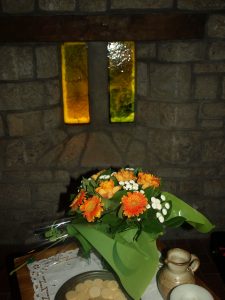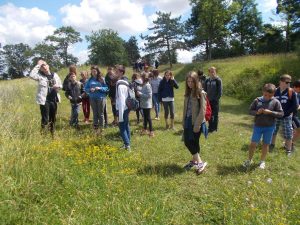God chose to make us wait
God, you chose to make yourself wait all the time for an Advent.
I don’t like waiting in line.
I don’t like to wait my turn.
I don’t like waiting for the train.
I don’t like waiting to judge.
I don’t like waiting for the moment.
I don’t like waiting another day.
I don’t like to wait because I don’t have time and I live only in the moment.As you well know, everything is done for me to avoid waiting : credit cards and free services, credit sales and cash machines, phone calls and photos with instant development, telex and computer terminals, television and radio flashes… I don’t need to wait for news, it precedes me.
But you, God, have chosen to make yourself wait for the time of an entire Advent.
Because you have made waiting the space of conversion, face to face with what is hidden, wear and tear that does not wear out.Waiting, only waiting, waiting for waiting, intimacy with waiting that is in us because only waiting awakens attention and only attention is capable of loving.
Everything is already given in expectation, and for You, God, Waiting conjugates Praying.
by Father Jean Debruynne
40 days of Lent and a small test
Here we are in the Lenten Season. We still know some days of the rigours of Winter (cold, rain, wind) and we are already invited to turn to the Feast of Easter, associated with Spring.
Easter is, indeed, the horizon of our approach. Forty days of Lent are a path which makes us cross the desert to open us to life. The desert reminds us of lack, fasting, a kind of hardship, the purpose of which is to direct our desire to something better. It is not a question of “mortifying” ourselves but, on the contrary, “to animate” ourselves, to do good to ourselves, by digging within us a space to welcome what only God can give us: his Life in plenitude.
To favour this opening to the Gift of God, each can look for the appropriate way suited to one’s situation, to one’s concrete existence, and to one’s daily life. So THIS way is not an “extraordinary” effort, it is to be chosen in the “ordinary” of life, for example the relation to God – prayer, reading of the Word of God, or the relation to the others – sharing, solidarity, listening, or the relation to goods – fasting of food, drink, tobacco, Internet, computer, TV …
To know if the chosen means or “effort” for Lent is good, a small test: does it make me less unpleasant towards those who live with me? Does it put peace and joy in my heart?
Bro. Jean-Yves Hamon
New year: a blessing
To bless, it is to speak well or to speak well of somebody (bene-dicere ). We bless God who gives us everything. But it is at first God who blesses us. The blessing is as the BASICS of any true relation. To bless should be the basic attitude of every educator (parent, teacher, and animator). Children need that their parents and their educators bless them. In their turn, they will address the adults who trust them, and whom they trust, words of blessing, gratitude, and thanksgiving.
To trust in ourselves and to grow up, we need to be blessed, to hear encouraging words, which help us to live, to continue the road, to overcome obstacles, to overcome trials … Let us remember ourselves all these words which were for us factors of self-fulfilment, of growth … On the contrary, other words hurt us, destroyed us, discouraged, brought down, excluded, rejected…
In Mark’s Gospel (10: 46-52), we find this situation: Bartimaeus, a blind beggar, is on the side of the way, completely off! … Jesus speaks to him through other people – Jesus loves the intermediaries: “Take heart, get up, he is calling you”. Here is a word of blessing, a word of encouragement, a friendly word (which wishes well) and a word which is beneficial.
Let us address each other words of blessing. By so doing, we contribute to the well-being of those who live with us, and thus really live as the children of God who does not stop blessing us … It is never too late to begin!
Bro. Jean-Yves Hamon
En marche… !
Marcher, c’est déplacer notre pied d’un lieu connu, ferme et sûr, pour le poser un peu plus loin, c’est prendre appui alternativement sur la jambe droite puis sur la jambe gauche. C’est évident pour nous, nous n’y pensons pas… Et pourtant, observons un enfant qui risque ses premiers pas : au début, que d’efforts pour décoller sa jambe du sol et la projeter en avant ! Mais après quelques semaines de tâtonnements, d’hésitations, de chutes aussi, quelle fierté de pouvoir se déplacer avec une aisance toute relative…
De même lorsque nos décidons de partir à pied sur une longue distance, pour un pèlerinage, nous pouvons être partagés entre l’ivresse de l’aventure et la peur de l’inconnu. Nous hésitons… Rester sur place est tellement plus confortable, mais nous pressentons que la vie est en avant !
Partir sur la route, c’est laisser derrière nous ce qui nous encombre, ce qui est lourd, inutile, superflu : alléger notre sac permet d’avoir l’esprit et le cœur légers… Partir, c’est aussi quitter, pour un temps, parents et amis, pour nous risquer à devenir nous-mêmes, à exister par nous-mêmes… C’est choisir de tracer notre propre chemin, d’aller seuls, même si nous marchons à plusieurs, car pour chacun l’expérience est unique…
Seuls, mais pas solitaires, car accompagnés, conduits, poussés par l’Esprit, sur des chemins toujours nouveaux, où il nous devance… L’Esprit en effet aime ces moments de disponibilité, de calme, de gratuité, pour inspirer ceux qui lui font confiance, ceux qui vont là où ils nous voulaient peut-être pas aller…
Prendre la route, c’est sortir de chez nous, sortir de nous-mêmes, pour aller à la rencontre des autres différents, de ceux qui cheminent comme nous, animés par le désir d’aller voir ailleurs, et de ceux qui vivent dans les villes et villages que nous traversons… C’est savoir nous arrêter pour saluer, pour dire une parole de salut, de bienveillance, pour faire conversation, pour écouter, pour partager, recevoir et donner.
Marcher, c’est avancer, non seulement avec nos pieds, mais aussi avec notre tête et notre cœur ; nos pensées, elles aussi, cheminent. La marche est souvent propice à la réflexion, à la méditation, à la contemplation, à la relecture de vie, à la préparation d’une décision… Marcher c’est se projeter vers l’avant…
Marcher, c’est aller quelque part, avoir une destination, tendre vers un but… et c’est souvent trouver autre chose que ce que nous avions imaginé au départ… Au fond, n’est-ce pas chercher Dieu… l’Autre par excellence, qui toujours nous échappe et nous invite à le chercher encore ?…
C’est enfin, comme les mages, regagner notre pays par un autre chemin, car la route nous a transformés, creusés, libérés.
F. Jean Yves Hamon





